In short, many of the people who set policy in Raleigh are banking on the premise that educators in NC are not truly knowledgeable of all the facets of pubic education to really see how matters can be manipulated for special interests.
Educators wear many hats, have various undefined expectations, are constantly bombarded with tasks, and that is on top of being curriculum experts and the actual instruction of students.
Days are still 24 hours. Families and personal lives are still important. Mental health is paramount.
Policy makers know that and keeping up with all of the issues surrounding public education can be a full-time endeavor in and of itself. But this veteran teacher wants to make sure you as an educator are aware of some of the most important defining elements that affect public schools in North Carolina.
1. How Public Schools in NC Are Funded.
The Public School Forum of North Carolina’s publication the 2014 Local School Finance Study provides a great history of the state’s practice in funding public schooling which is rooted in the proclamation that all children in the state ages 6-21 are guaranteed a good public education. The publication stated:
North Carolina’s first state constitution in 1776 included an education provision that stated, “A School or Schools shall be established by the Legislature for the convenient Instruction of Youth.” The legislature provided no financial support for schools.
A century later, the constitution adopted after the Civil War required the state to provide funding for all children ages 6-21 to attend school tuition-free. In 1901, the General Assembly appropriated $100,000 for public schools, marking the first time there was a direct appropriation of tax revenue for public schools. Today, the constitution mandates that the state provide a “general and uniform system of free public schools” and that the state legislature may assign counties “such responsibility for the financial support of the free public schools as it may deem appropriate.” N.C. Const. art. IX, § 2 (see sidebar, “Sources of Local School Finance Law: The North Carolina State Constitution”).
Apart from the constitutional provisions, a major change in the school funding structure occurred during the Great Depression. Under the School Machinery Act (enacted in 1931 and amended in 1933), the state assumed responsibility for all current expenses necessary to maintain a minimum eight-month school term and an educational program of basic content and quality (instructional and program expenses). In exchange for the state’s expanded role, local governments assumed responsibility for school construction and maintenance (capital expenses). The School Machinery Act established counties as the basic unit for operating public schools, which is maintained today with large county-wide school systems, except in the 11 counties that also have city school systems.
What this means is that the state has the responsibility for the financing of basic functions for public education like salaries for personnel, services for special-needs students, technology, professional development, even textbooks (remember what new ones look like?).
This is from the Public School Forum of North Carolina’s site currently:
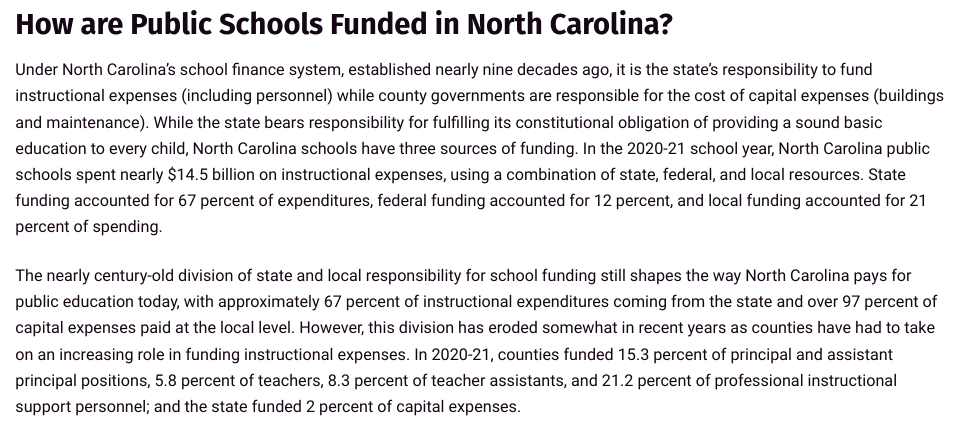
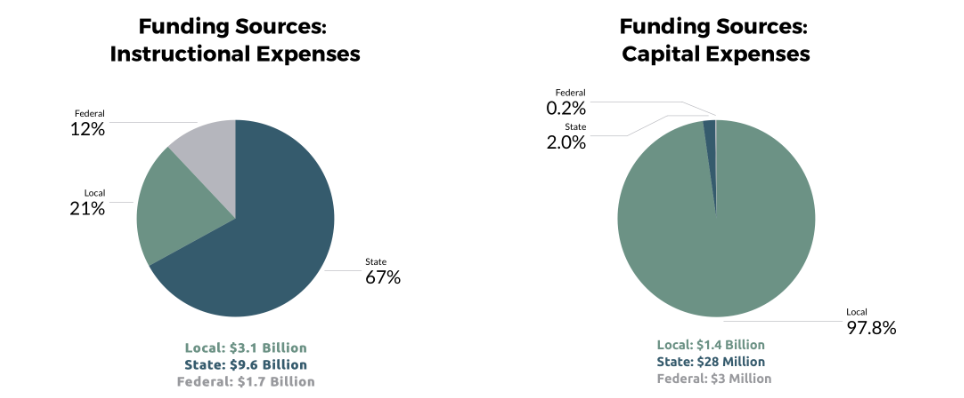
And there is this:
When looking at actual dollars spent, state funding for school operations has increased from $3.44 billion in 1992-93 and represents the largest part of the state’s budget. But while the level of funding has increased over time due to enrollment and cost increases, the percentage of the state’s General Fund dedicated to education has declined sharply since 1970. In 2020-21, 40.8 percent of the state’s General Fund was appropriated for K-12 public education, a significant drop from 1970, when it was 52.5 percent. According to the Department of Public Instruction, if public education were funded at the same percentage of the General Fund as in 1970, districts and schools would have an additional $3 billion to educate our students.
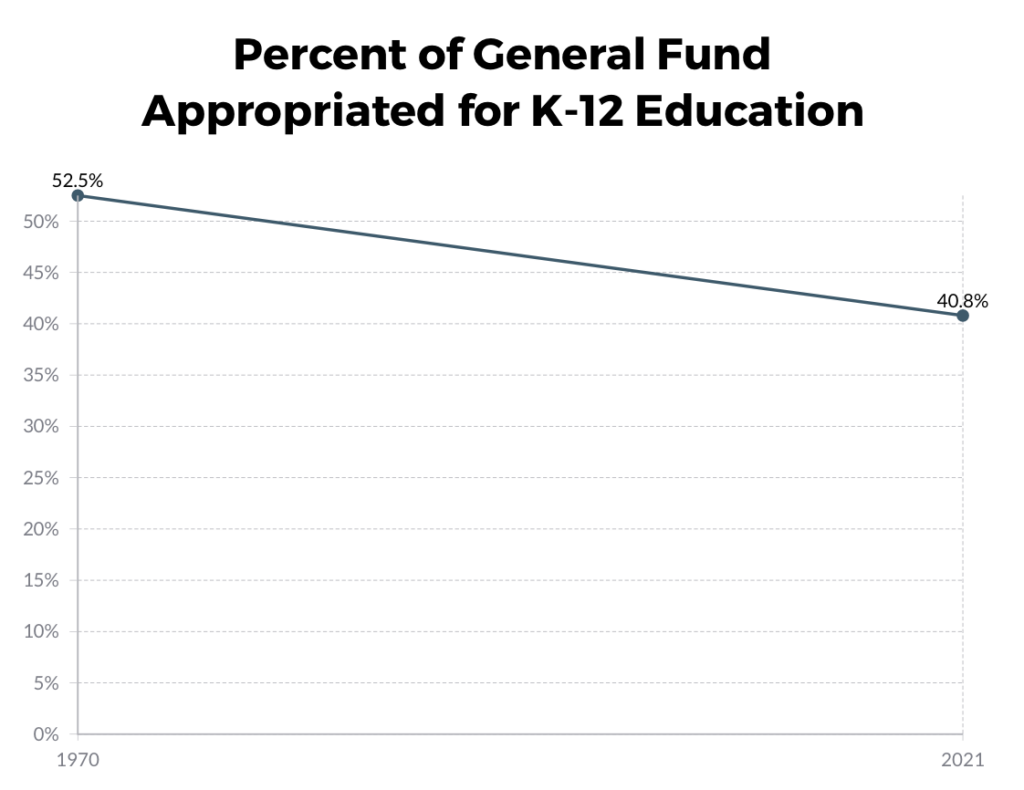
Oh, and maybe look into the LEANDRO decision.
2. What Teachers Had In 2012 But Has Been Taken Away.
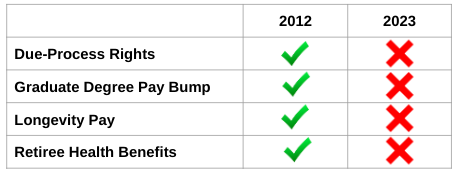
Specifically there are four distinct actions taken to keep teachers in NC’s public schools from retiring as teachers in public schools.
Removal of due-process rights. At one time the NC General Assembly took away due-process rights for all teachers. It was ruled unconstitutional by the court system in the case for those veteran teachers who already got those rights when they became fully certified. However, newer teachers in the profession will not get due-process rights in North Carolina. That will surely inhibit those teachers from advocating loudly for schools in the future for fear of reprisal.
Graduate Degree Pay Bumps Removed – Because advanced degree pay is abolished, many potential teachers will never enter the field because that is the only way to receive a sizable salary increase to help raise a family or afford to stay in the profession. It also cripples graduate programs in the state university system because obtaining a graduate degree for new teachers would place not only more debt on teachers, but there is no monetary reward to actually getting it.
Longevity Pay – In the long session of 2014, the NC General Assembly raised salaries for teachers in certain experience brackets that allowed them to say that an “average” salary for teachers was increased by over 7%. They called it a “historic raise.” However, if you divided the amount of money used in these “historic” raises by the number of teachers who “received” them, it would probably amount to about $270 per teacher.That historic raise was funded in part by eliminating teachers’ longevity pay. Similar to an annual bonus, this is something that all state employees in North Carolina — except, now, for teachers — gain as a reward for continued service. The budget rolled that money into teachers’ salaries and labeled it as a raise. That’s like me stealing money out of your wallet and then presenting it to you as a gift.
Retiree Health Benefits – If you are hired as a new teacher after 2020 is over, you will not have something that teachers hired before 2021 have: retiree health benefits. A 2020 report in the News & Observer explains that the budget set forth in 2017’s long session of the NCGA did away with retiree health benefits for hires on and after January 1, 2021 to “save money.”
3. How Teacher Retirement Is Being Manipulated.
Below is the salary schedule for a teacher in North Carolina for the 2023-2024 school year.
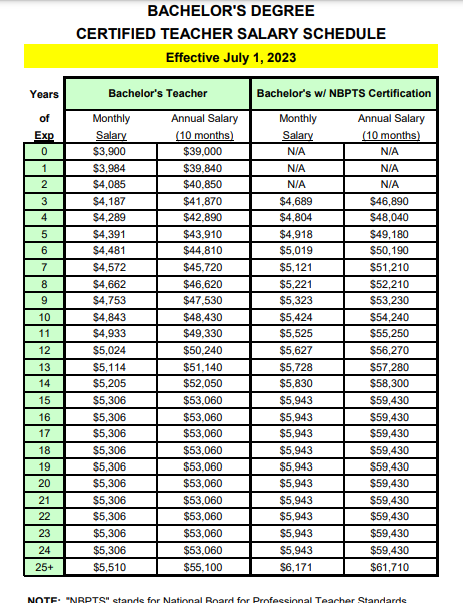
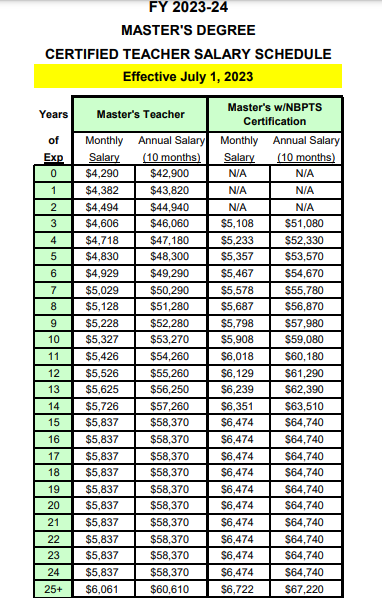
Any teacher new to the profession in the last nine years would never be on the second schedule because newer teachers are not allowed a pay bump for graduate degrees. Notice how the salaries also plateau after year 15.
So…In essence, that second salary schedule would not exist for new teachers in the last few years.
There is no longevity pay included as it does not exist for teachers any longer.
Retirement is based on the average of four highest paid years of a teacher’s career. According to the 2023-2024 salary schedule, the most a teacher with a master’s degree earned after 2014 and NBPTS certification could make (and be eligible for full pension with the correct number of years of service) is $61,710.
And as of 2021, new teachers are not even going to get retiree health benefits.Now go back a few years before the Great Recession.


If you went back to the 2008-2009 salary schedule, a teacher with a master’s degree and NBPTS certification could make (and be eligible for full pension with the correct number of years of service) an average of $64,750. And all veteran teachers would have received longevity pay above and beyond what the salary schedule said.
Now imagine if that same schedule was in play for teachers today and adjusted for inflation.
4. Per Pupil Expenditure Is Not Rising.

That data graph above is a few years old, but the trend is still the same. North Carolina has not returned to pre-recession funding levels.
Here’s some more recent figures that do not put North Carolina in a really positive light. From U.S. News & World Report which used data for the school year ending in 2019:
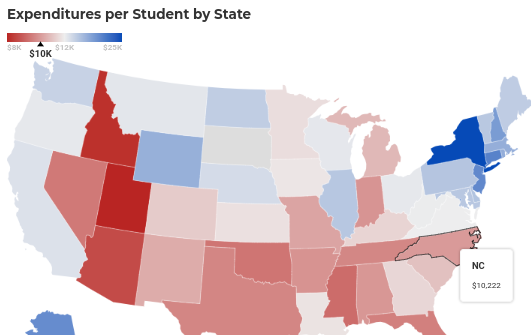

Here is a report that was updated in June of 2023:


Then there is this from EdNC.org:


Policy and budget analyst Kris Nordstrom calculated this from the most recent budget:
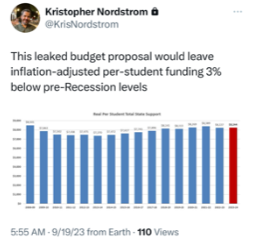

The argument that the GOP-led General Assembly has made repeatedly is that they are spending more on public education now than ever before. And they are correct. We do spend more total money now than before the recession hit. But that is a simplified and spun claim because North Carolina has had a tremendous population increase and the need to educate more students.
Oh, and look at the increase in labor costs in general.
5. What Actually Is The Job Description Of A Teacher?
what exactly is the job description of a North Carolina public school teacher?
This is by no means a loaded question or one that is asked to create a nebulous web of answers that would cloud the actual debate. But if public education is to be the issue that defines another session of the NC General Assembly which holds the budget hostage over teacher pay, that decides votes in a huge upcoming election year, and that all people already have some sort of stake in, then what the role of a public school teacher in North Carolina might need to be more understood.
Is it to deliver curriculum and teach mastery?
Is it to help students grow into productive citizens?
Is it to “teach” the whole child – intellectually, mentally, emotionally, etc.?
Is it to get students to pass standardized tests?
Is it to keep students safe?
Is it all all of those things and much more?
Below is a screenshot from the statutes of the General Assembly concerning the “duties” of teachers.
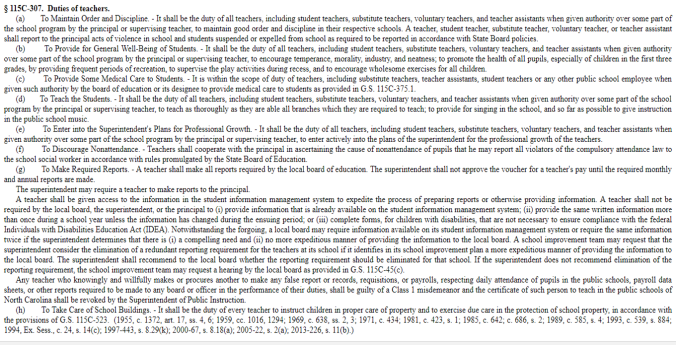
They include a variety of “duties,” some more defined than others: discipline, “teaching,” reporting, provide for well-being, medical care, keep order, etc.
Now throw in some other factors and variables that have a direct effect on those “duties” like poverty, hunger, sickness, apathy, lack of resources, overcrowding, and respect for the profession. It makes those duties in the above statute seem a little more expansive.
6. Where Are The Vacancies?
Here’s a good resource: Northcarolina.schoolspring.com.

But it only tells a part of the story about vacancies.
On September 26, 2022 (one month into the last traditional school year), there were well over 15,000 vacancies on TeachNC’s job search feature.
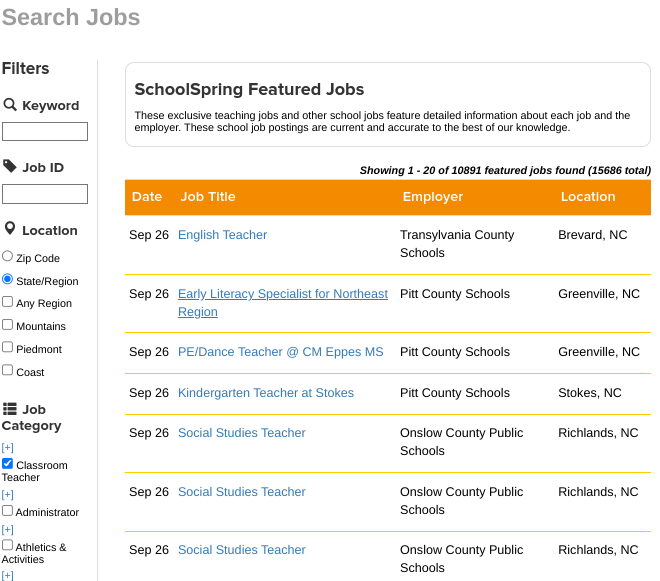
So where did those other 5K+ job vacancies go?
Were they filled? Don’t think so.
Are they no longer being advertised because they were left unfilled for such a long time?
Were they removed intentionally to make the total look more appealing in order to hide the fact that many were never going to be filled because of the way that North Carolina treats its educators?
Was it just decided that since those vacancies had not been filled that late in the school year those duties were just being completed by others as extra work and then it was decided that saving the money from not having to pay for new educators could be used someplace else like tax cuts?
7. What Is Your Teacher Tax?
And it’s a powerful tool to show how much money teachers have lost since salary schedules have been “amended” since the Great Recession. Public school advocate John deVille describes it best:
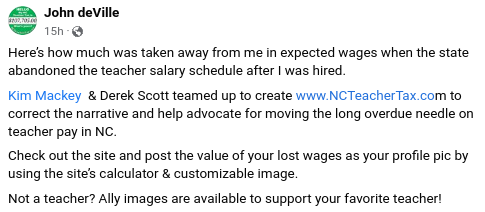

As a veteran teacher in NC who entered the profession last century, I put in my information and asked the program to calculate based on money lost since the 2007-2008 salary schedule.

Because graduate degree pay has been removed for teachers beginning in 2014 and after, the program does not account for graduate degree pay for veterans. BUT the “tax” would actually be higher as the salary schedule for graduate degree pay that would be in place would show higher losses for those teachers.
The same for NBCTs.
And this is just looking at bachelor degree pay.
8. How Not Transparent NC’s Voucher System Is.
Currently NC is on pace to give almost a billion dollars to vouchers within the next ten years.
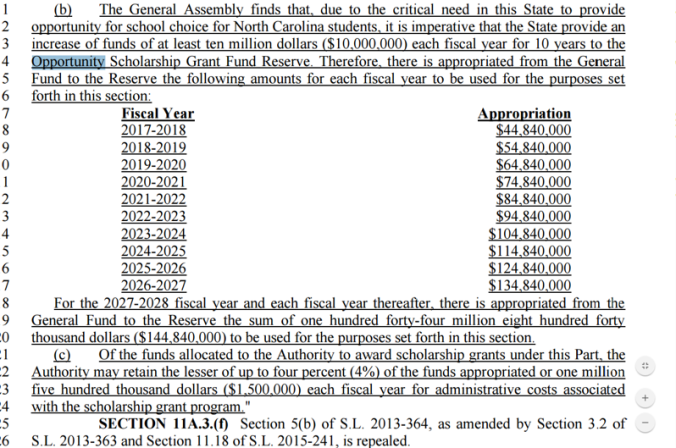
And this is a system that was considered the least transparent in the entire country in 2017. From the Children’s Law Clinic at Duke’s School of Law:
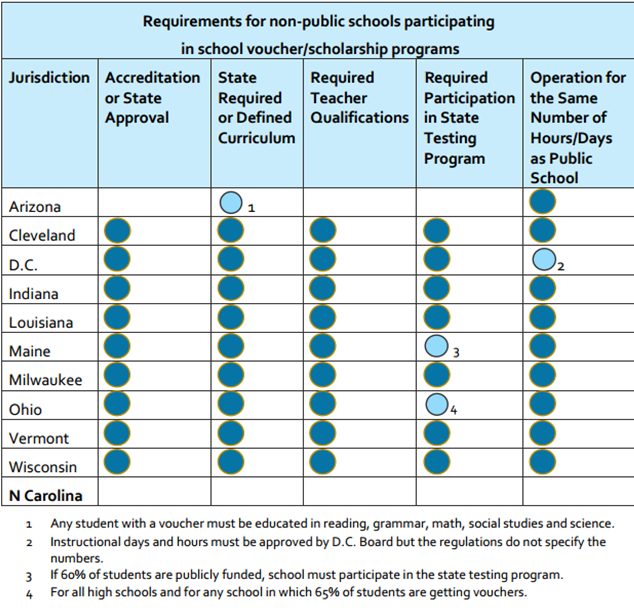
And still is in the 2020 version of the report from the same research team.

9. Importance of Classified Staff.
Think of what would happen if they were not in our schools.
They are just as vital to the operation of our schools as anyone else, and I am thankful as a teacher to have these people keep our schools not only functioning, but vibrant.
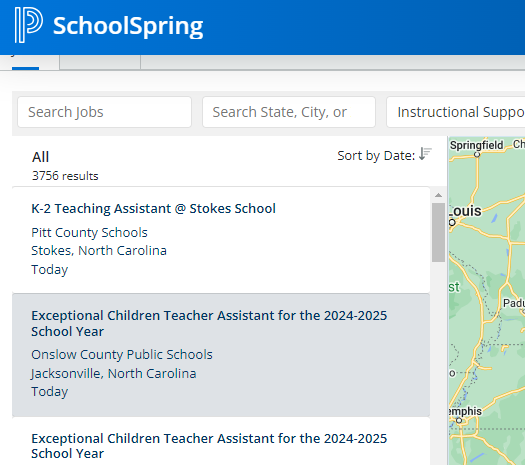
If you have never really been inside the workings of a public schools, know that so many people work behind the scenes to help educate our students. If they were not doing what they do, then schools would never be as effective.
- Teacher Assistants
- Testing Coordinators
- Administrative Assistants
- Guidance Counselors
- Media Assistants
- Interpreters
- Therapists – speech, occupational, physical
- Data Control and Clerks
- Janitors
- Maintenance
- Bus Drivers and Transportation
- Food Services
- Crossing Guards
- Nurses
10. The Red Herring Is The Official State Fish.
The leader of the GOP in the state of NC and its presumptive nominee for governor, Lt. Gov. Mark Robinson, has gone a long way in making sure you believe the facade that he is defending our public schools from teaching a “version” of history that “indoctrinates” students with radical beliefs.
In 2021, Robinson started a petition to lobby the very state school board he serves on.
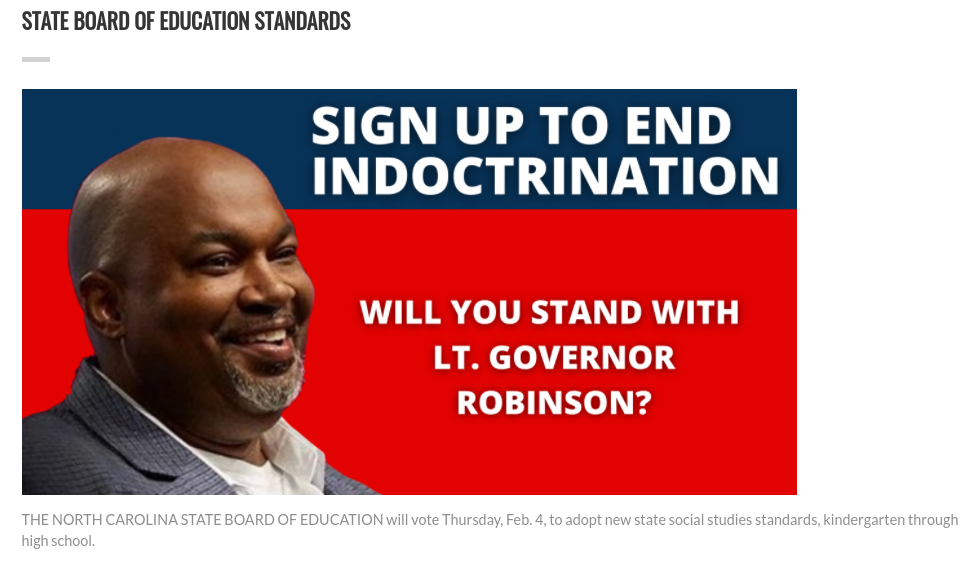
Then he went on to create F.A.C.T.S.
And you can still issue a complaint on the Lt. Gov.’s official website.
Please note that not a single complaint has led to a merited investigation of any teachers in this state.
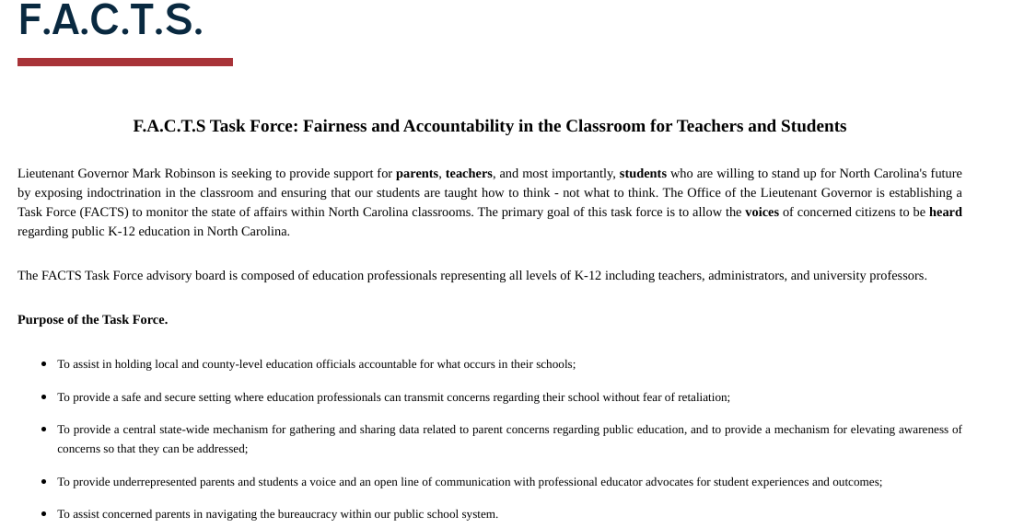
Now look at the CRT “scare” tactics.
Book bans?
Lots of attention being placed on things that really do not exist.
